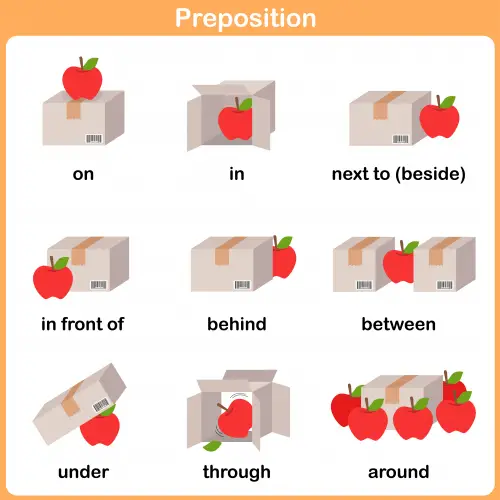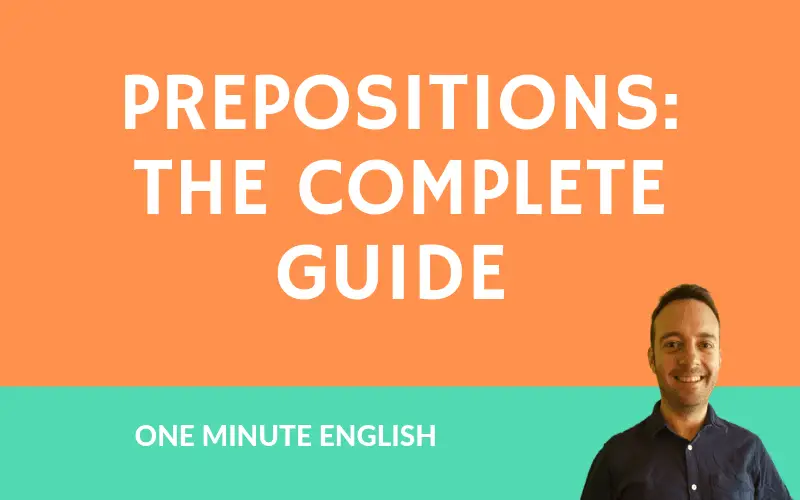Las preposiciones pueden ser una parte difícil de aprender de un idioma porque son palabras cortas y a menudo se usan en situaciones diferentes a las de otros idiomas. Como profesor, me he dado cuenta de que los estudiantes, incluso con un alto nivel de inglés, siguen encontrando las preposiciones difíciles y cometen errores con regularidad.
Para solucionar este problema necesitas aprender a usar las preposiciones y conocer por qué usamos preposiciones en diferentes contextos y luego, por supuesto, practicar lo que aprendes.
¿Qué es una preposición?
Una preposición en inglés es una parte del discurso que muestra la relación entre un sustantivo y otra parte de la oración. También puede haber preposiciones y frases preposicionales dependientes que explicaré a continuación.
The man is behind the house
↑ ↑ ↑
Sustantivo Prep Sustantivo
Este ejemplo muestra la relación entre dos sustantivos (man and house)
The man drove through the tunnel
↑ ↑
Prep Sustantivo
Este ejemplo muestra dónde el hombre manejó (a través del túnel)
¿Cómo usar una preposición?
Usamos preposiciones en diferentes contextos pero en general usamos una preposición con un sustantivo para mostrar:
El tiempo: I was born in March.
↑ ↑
Prep Sustantivo
La dirección: I walked towards the bar.
↑ ↑
Prep Sustantivo
Ubicación:I am in front of the cinema.
↑ ↑
Prep Sustantivo
O para introducir algo nuevo: I want a coffee with milk.
↑ ↑
Prep Sustantivo
Observa cómo la preposición suele preceder al sustantivo. Este sustantivo es llamado el objeto de la preposición. Queremos mostrar la relación de este sustantivo con la otra parte de la oración.
Una estructura común es: Sujeto Verbo Preposición Sustantivo
I went for a coffee.
Preposiciones antes del verbo
No solemos usar una preposición antes de un verbo, con la excepción de cuando tienes dos verbos. Si tienes un verbo después de una preposición, entonces necesitas ponerlo en la forma «ing» (gerundio).
What do you think about going to the park?
↑ ↑ ↑
Verbo Prep Verbo
I am good at playing football.
↑ ↑ ↑
Verbo Prep Verbo
Estos son ejemplos de preposiciones dependientes en inglés (to think about, to be good at)
Gerundios e infinitivos
I (look forward to) playing football.
↑ ↑
Prep Verb
En este ejemplo “to” es una preposcisión
I want (to play) football.
↑
infinitive
En este ejemplo “to” es parte del infinitivo (want +infinitive)
¿Cuáles son los diferentes tipos de preposiciones?
A menudo vemos preposiciones en inglés para conectar dos partes de una oración, pero también usamos preposiciones como preposiciones dependientes y en frases preposicionales.
En estos casos es mejor aprender las frases en «trozos». Esto significa aprender unas pocas palabras juntas y luego pueden usar estas frases una y otra vez.
Por ejemplo:
How is it going?
No necesitas pensar en el significado de cada palabra aquí. Sólo sabes que esta es una forma de preguntar sobre la vida de alguien.
Así que aprender en trozos es una buena idea para los siguientes tipos de preposiciones
Preposiciones dependientes en inglés
Algunos verbos, sustantivos y adjetivos toman preposiciones naturalmente y siempre se usan juntos. Probablemente hayas notado algunos ejemplos como «Wait for» o «Listen to». No hay reglas cuando se trata de esto, ¡así que sólo tienes que aprenderlas a medida que las encuentras!
- Verbo + preposición
Hay muchos verbos que se usan con preposiciones, así que el verbo y la preposición trabajan juntos como una unidad. Necesitas aprender esto y prestar atención a cuándo los verbos toman preposiciones.
Algunos ejemplos
You can rely on me
I know that I can depend on you
He succeeded in his attempt
Do you believe in God?
What has happened to your dress?
Algunas veces la preposición puede cambiar el significado, por ejemplo:
To think of something (una idea)
To think about something (deliberar, pensar por más tiempo, considerar)
¡Las preposiciones son difíciles por eso aquí hay un GIF mio bailando al ritmo de la música que estoy escuchando o “listening to”!

- Sustantivo + preposición
Mira estos ejemplos:
What is the reason for his bad behaviour?
This is a photograph of when we were on holiday.
There has been a huge increase in sales.
I hope we find a solution to the problem
- Adjetivo + preposición
It was generous of you to offer to clean my car
My boss was angry about (algo) the sales results
My boss was angry with (alguien) me for not selling enough cars
Joan is married to my brother
Presta atención a estos ejemplos porque pueden ser distintos en tu idioma.
Frases preposicionales
Las frases preposicionales son grupos de palabras con una preposición al principio y al final en el objeto de esa preposición (generalmente un sustantivo). Esta es una buena manera de tener expresiones comunes que podemos usar en muchas situaciones
Podemos pensar en ellos como una preposición y un sustantivo que se ayudan mutuamente para expresar una cosa como……….
In the middle
In time or on time or about time
I have been waiting forever for a complete guide to prepositions
¿Puedes terminar la oración con una preposición en inglés?
¡Sí! Puedes terminar una frase en inglés con una preposición. A veces es más natural en el inglés moderno terminar una oración con una preposición. He aquí algunos ejemplos de cuándo puedes hacerlo:
- Wh Questions
Who are you talking to?
2.Oraciones subordinadas
She told me that was the person she couldn’t put up with.(Bonus point for me! 2 prepositions!!!)
3. Estructuras en la voz pasiva.
She was being talked about
4.Estructuras en infinitivo
She had to do her buttons up
Conclusión
Como puedes ver las preposiciones pueden ser usadas en tres maneras:
Para mostrar la relación entre dos cosas
Una preposición dependiente
En una frase preposicional
También vemos preposiciones en frases verbales (phrasal verbs). Puedes ver muchos ejemplos de frases verbales en mi canal de Youtube o puedes tomar un curso de Espresso English.

Las 46 preposiciones más comunes en inglés (con ejemplos)
About
The book is about food.
What is the story about?
Above
I live above a shop.
The shelf is above the T.V
Across
I live across the road.
The shop is across from the cinema.
After
The movie is after dinner.
I always study after school.
Against
Barcelona play against Liverpool.
I hit my head against the wall.
Along
I always walk along the river.
We are going to the cinema. You should come along.
Among
We are among the best footballers in the country.
Who among us is a good fighter?
Around
There around 50 people in this room.
I live around the corner.
At
Let’s meet at the park.
Class starts at 9am.
Before
I always drink coffee before work.
I brush my teeth before bed.
Behind
Look out!! There is a big dog behind you.
I live behind a cinema.
Below
The basement is below my house.
See below!
Beneath
There are new shoes beneath the stairs.
There is water beneath the ground.
Beside
I sit beside John in class.
I live beside a petrol station.
Between
There is a big space between us.
You need to leave a space between the title and the paragraph.
Beyond
Astrophysics is beyond my knowledge.
What is beyond the park?
But
I like ice cream but I prefer chocolate.
It was a good movie but I didn’t like the ending.
By
I did it all by myself.
You need to write the report by Monday.
I live by the river.
Down
I walked down the road.
The office is down the stairs.
During
I fell asleep during the movie.
It happened during the game.
Except
I like all vegetables except broccoli.
Everybody is going except me.
For
I ate bread for breakfast.
I had to wait for a month.
From
I am from Ireland.
The class is from 9 to 10.
In
I live in Dublin.
The water is in the bottle.
Inside
Let’s go inside. It is cold out here.
I put the cup inside the cupboard.
Into
I walked into the room.
He walked into the wall!
Like
My brother is like my father
You look like George Clooney.
Near
I live near you.
The toilet is near the stairs.
Of
This piece is part of the puzzle.
I am part of the team.
Off
I got off the train at Heathrow airport.
I took off my sweater.
On
I work on Tuesdays.
The book is on the table.
Out
I walked out of the shop.
Take out the trash.
Outside
I don’t like to go outside in the winter.
The football field is outside.
Over
He lived in a flat over a supermarket.
Go over there!
Past
I live past the shopping center on the right.
Go past the cinema and turn right.
Since
I have been here since the morning.
I have played guitar since I was 16.
Through
We need to drive through the tunnel.
I have seen many concerts down through the years.
Throughout
He talked throughout the whole movie.
I have traveled throughout the country.
To
I am looking forward to the movie.
I work from 9 to 5.
Towards
Go towards the center of the town.
We are moving towards the station.
Under
The book is under the T.V.
I have 50 people working under me.
Until
I have to work until 6.
We will be here until the end.
Up
Let’s go up to the roof.
I need to look that up in the dictionary.
With
I love having a coffee with my breakfast.
I live with four other people.
Within
It is within your rights to apply for citizenship.
That is within the rules.
Without
I can’t live without Netflix.
I sometimes like coffee without sugar.

